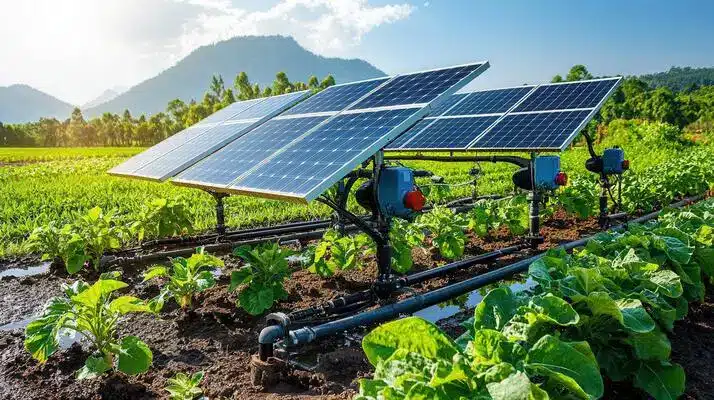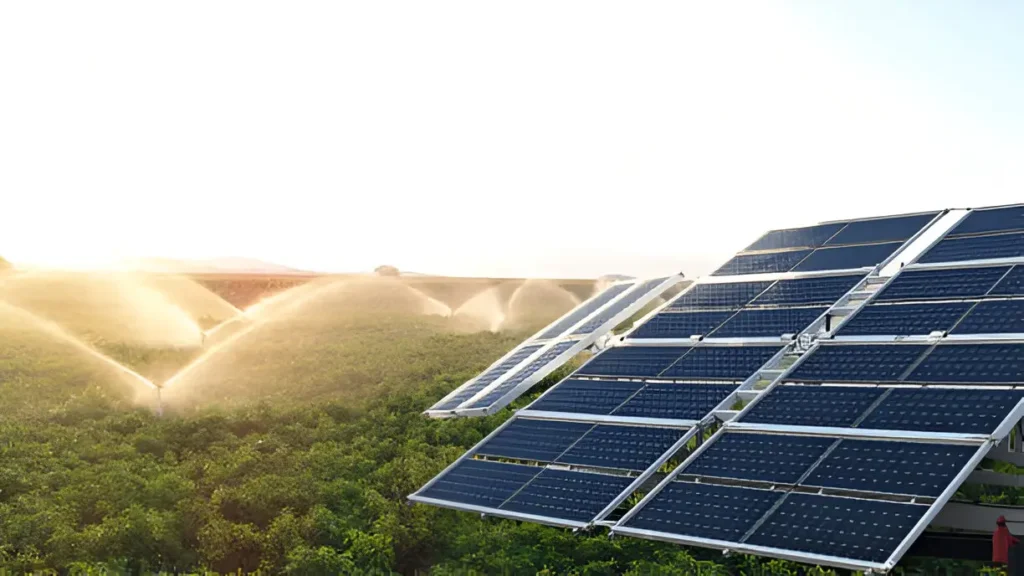Solar-Powered Irrigation: Revolutionizing Ghana’s Agriculture
Discover how solar-powered irrigation is transforming Ghana’s agriculture by boosting crop yields, reducing costs, and promoting sustainable farming practices. Imagine transforming the way you farm by harnessing the power of the sun. Solar-powered irrigation systems are not just a futuristic concept; they are revolutionizing agriculture right now in Ghana.
If you’ve ever faced challenges with unreliable water supplies or high energy costs on your farm, this innovation could be the game-changer you’ve been waiting for. By the end of this article, you’ll discover how these systems are not only boosting crop yields but also saving you money and protecting the environment.

Dive in to explore how solar energy can turn your agricultural dreams into reality and make your farming efforts more sustainable and productive.
Benefits Of Solar-Powered Irrigation
Solar-powered irrigation systems offer numerous advantages for farmers in Ghana. These systems harness solar energy to pump water for crops. This sustainable method replaces traditional irrigation methods. Farmers benefit from reduced costs and a healthier environment. Let’s explore these benefits in detail.
Cost Efficiency And Savings
Solar-powered irrigation reduces electricity bills significantly. Farmers no longer rely on diesel or grid electricity. The sun provides free energy daily. Initial setup costs can be high. Yet, long-term savings outweigh these expenses. Maintenance costs are also lower. Fewer parts mean fewer repairs. This system is a smart investment for farmers.
Environmental Impact
Solar energy is clean and renewable. It reduces greenhouse gas emissions. Traditional irrigation methods pollute the air. Solar systems use the sun’s energy without harming nature. This promotes a healthier environment for future generations. Water is also used more efficiently. Solar systems prevent water wastage. This is crucial in regions with scarce water resources.
Energy Independence
Solar-powered irrigation offers energy independence. Farmers are not dependent on the grid. Power outages do not affect them. They control their energy source. This ensures a reliable water supply for crops. It empowers farmers to manage their resources better. Energy independence boosts agricultural productivity. It creates a more resilient farming community.
Technological Advancements
Technological advancements are transforming agriculture in Ghana. Solar-powered irrigation systems are at the forefront of this change. These systems reduce reliance on rain and traditional energy. They provide a sustainable solution for farmers. This helps increase productivity and ensure food security. Innovations in solar technology enhance these benefits. They make irrigation more efficient and accessible. Let’s explore these advancements in detail.
Innovative Solar Panels
Solar panels have evolved significantly. Modern panels are more efficient. They capture sunlight even on cloudy days. This ensures a steady water supply for crops. New materials in panels increase energy absorption. They are also more durable. This reduces maintenance costs for farmers. Lightweight designs make installation easier. Farmers can place panels in optimal positions. This maximizes their energy output.
Smart Irrigation Systems
Smart irrigation systems are game-changers. They use sensors to monitor soil moisture. This helps farmers water crops only when needed. It conserves water and reduces waste. Farmers can control these systems remotely. Mobile apps provide real-time data. This allows for precise water management. Smart systems also adjust to weather changes. They predict rain and reduce water usage. This ensures crops receive the right amount of water.
Impact On Ghana’s Agriculture
Solar-powered irrigation systems significantly enhance agriculture in Ghana. They provide reliable water access, reducing dependency on rain. This technology also helps farmers increase crop yields and ensures food security.

Ghana’s agriculture is undergoing a transformative shift with the integration of solar-powered irrigation systems. These systems are not just a technological advancement; they’re a game-changer for farmers across the country. By harnessing the power of the sun, Ghanaian farmers are experiencing remarkable improvements in their productivity and sustainability.
Increased Crop Yields
Imagine doubling your harvest with the same plot of land. Solar-powered irrigation systems make this possible by providing a consistent water supply. This means crops get the hydration they need, even during dry spells. A tomato farmer in the Volta Region shared how his yields increased by 40% after switching to solar irrigation. It’s a simple change with profound effects on food security.
Sustainability And Resilience
Solar irrigation systems are eco-friendly. They reduce reliance on fossil fuels, cutting down on emissions and costs. This makes farming more sustainable and less harmful to our planet. Moreover, they enhance resilience against climate change by ensuring water availability.
As weather patterns become unpredictable, having a stable water source is crucial. You’re not just growing crops; you’re safeguarding future harvests. Ghanaian farmers are paving the way towards a more sustainable future. But how will you contribute to this agricultural evolution? Embrace solar-powered solutions and witness the positive impact on your farm and community.
Challenges And Solutions
Solar-powered irrigation in Ghana faces challenges like high costs and maintenance. Effective solutions involve affordable technology and training. This helps boost agriculture, enhancing food security and livelihoods.
Solar-powered irrigation systems are transforming agriculture in Ghana, offering a sustainable solution to water scarcity. However, implementing these systems comes with its own set of challenges. Understanding these hurdles and their solutions is crucial for farmers looking to harness the power of the sun for irrigation.
Initial Investment Costs
One of the major challenges is the initial investment cost. Solar panels and pumps are expensive, and this can be a barrier for many farmers. However, innovative financing options are becoming available. Consider cooperative models where farmers pool resources to invest in a shared system. This reduces the financial burden on individual farmers.
Maintenance And Training
Maintenance is another challenge that can deter farmers from adopting solar-powered systems. These systems require regular upkeep to function efficiently. Without proper maintenance, they can quickly become ineffective. Training is crucial. Farmers need to know how to maintain and troubleshoot their systems. Workshops and local training sessions can empower farmers, ensuring they get the most out of their investment.
Imagine the confidence you’ll gain by knowing how to fix a system glitch yourself. It’s not just about the equipment; it’s about building skills and independence. By addressing these challenges with practical solutions, solar-powered irrigation can become a viable option for boosting agriculture in Ghana. Are you ready to explore these opportunities and contribute to a more sustainable future?
Regulatory Framework
Regulatory frameworks ensure safe and efficient use of solar irrigation systems. They establish guidelines for installation and maintenance. Regulations help maintain quality standards and protect farmers. They also promote training programs for skill development. Compliance with regulations builds trust among stakeholders. A strong framework supports sustainable agricultural practices.
Future Prospects
Solar-powered irrigation systems present a bright future for agriculture in Ghana. They offer sustainable solutions to water scarcity issues. These systems help farmers improve crop yields. With solar energy, farmers can reduce their reliance on expensive fuel. This change boosts their income and improves their quality of life. The future of solar-powered irrigation in Ghana looks promising.
Expansion Opportunities
Ghana has vast agricultural lands with potential for solar irrigation. Many regions still depend on rain-fed agriculture. Solar systems can bring water to these areas year-round. Expanding solar irrigation can increase food production. It can also create job opportunities. Solar irrigation can reach more farmers. Local organizations can play a role in spreading this technology.
Technological Innovations
Solar technology continues to evolve. New innovations make solar systems more efficient. These advancements lower costs and improve performance. Smart irrigation systems now use sensors. They help farmers use water more effectively. New solar panels are more durable and last longer. Such innovations make solar irrigation more accessible. They promise a brighter future for Ghana’s agriculture.
Frequently Asked Questions
What Are Solar-Powered Irrigation Systems?
Solar-powered irrigation systems utilize solar panels to pump water for agriculture. They offer a sustainable solution for farmers, especially in remote areas. These systems reduce reliance on fossil fuels, lower operational costs, and support eco-friendly farming practices. Their efficiency can significantly boost agricultural productivity in regions like Ghana.
How Do These Systems Benefit Ghana’s Agriculture?
These systems enhance agricultural productivity by ensuring a reliable water supply. They reduce dependence on erratic rainfall and costly diesel pumps. Solar-powered irrigation supports sustainable farming and helps mitigate climate change impacts. It improves farmers’ income, boosts food security, and fosters economic growth in Ghana’s rural communities.
Are Solar Irrigation Systems Cost-Effective?
Yes, solar-powered irrigation systems are cost-effective in the long run. Initial installation can be pricey, but savings on fuel and maintenance are substantial. They lower operational costs significantly. Over time, they offer a return on investment through reduced energy expenses and increased crop yields, benefiting farmers financially.
Can Solar Irrigation Work During Cloudy Days?
Yes, solar-powered irrigation systems can work during cloudy days. They are designed to store energy, ensuring a water supply even with limited sunlight. Battery storage systems help maintain operations during cloudy weather. This makes them reliable for continuous irrigation, vital for consistent agricultural productivity.
Conclusion
Solar-powered irrigation systems offer significant benefits for Ghana’s agriculture. Farmers gain access to reliable water sources. Crops grow better and yields increase. Costs for energy and maintenance are reduced. These systems support sustainable farming practices. They help farmers adapt to climate change.
Communities experience improved food security. Economic growth becomes more achievable. Investing in solar irrigation is a smart choice. It enhances farming efficiency and environmental health. Ghana moves towards a brighter agricultural future. A future powered by the sun.
